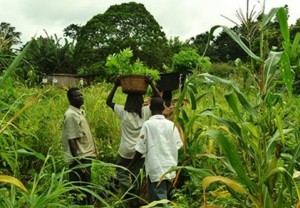AGRA urges Ghana government to focus on irrigation expansion
 The Alliance for Green Revolution in Africa (AGRA) has called on the government and its donor partners in the country to invest more in constructing irrigation facilities to ensure that farmers were engaged in all-year-round agricultural activities.
The Alliance for Green Revolution in Africa (AGRA) has called on the government and its donor partners in the country to invest more in constructing irrigation facilities to ensure that farmers were engaged in all-year-round agricultural activities.
Dr Kwesi Ampofo, Ghana’s Country Director for AGRA said the rainfall pattern in the country has significantly affected food production and security, which calls for adoption of various methods including irrigation to improve the situation.
He said due to climate change, which has caused the rainfall patterns to change, AGRA as part of its new strategic plans, would work with NASA to get a satellite system to provide ready information on weather patterns to farmers to enable them predict the right planting seasons.
Dr Ampofo who was addressing participants on the closure of AGRA’s Value Change and Financing Project said the 2015-2020 strategic plans of the organization would focus more on collaborative partnership in transforming agricultural productivity for smallholder farmers in Africa to reduce food insecurity.
The Value Chain and Financing Project, which was implemented by the Adventist Development and Relief Agency (ADRA) from 2011 to 2015 in the Northern Region and was financed by Danish International Development Agency (DANIDA) through AGRA and other partners.
Dr Ampofo said the organization has made significant impact in the agricultural sector by increasing crop yields of maize, soyabean, rice and maize, stressing that its mission and vision for the coming years would remain the same but would adopt more innovations that would improve the standard of living of farmers to reduce poverty significantly.
He indicated that its new areas of focus would be in West Africa, East Africa and Southern Africa saying, “In Ghana, our focus will be in the Northern and Brong Ahafo Regions”.
Dr. David Sarfo Ameyaw, Director for Strategic Monitoring and Evaluation for AGRA, Nairobi, Kenya indicated that the project, which was implemented at the cost of $16 million gave credits to farmers as well as inputs, equipment and access to marketing centres.
He said over 70,000 farmer households benefited directly and indirectly from the project explaining that agro dealers, small scale and medium enterprises and all benefited in capacity building while 385 demonstration plots were set up as training grounds for farmers.
He indicated that the project increased the yields of farmers to an average of 3.2 metric tons of all the crops under the project and that the best way for the government to reduce poverty and unemployment was to improve investment in agricultural sectors.
Dr Ameyaw said the gains the country made in the agricultural sectors in the past could be doubled if roads and access to markets were considered significantly while research and innovational methodologies were also addressed.
Mr Isaac Kankam-Boadu, Project Manager for ADRA Ghana’s Integrated Agricultural Production Improvement and Marketing Project (INTAPIMP) said inoculant fertilizer was highly used on the field and that results showed that the combination of composed and chemical fertilizer improved yield.
He advised farmers to adopt direct and transplanting methods during planting instead of broadcasting their seeds and explained that broadcasting reduced productivity.
Mr Kankam-Boadu said many farmers acquired tractors and other farm equipment through the project and noted that it was surprising that many farmers quickly adopted innovative farming despite their illiterate backgrounds and called for the need for more extension services to be extended to farmers in rural areas.
Mr Sylvester Adongo, an agriculturalist, urged AGRA to focus its attention on the poultry sub-sector since that area holds great potential for growth and productivity.
Source: GNA
